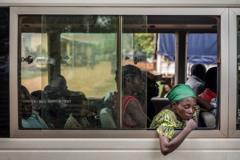In a heart-wrenching tale of desperation, hundreds of refugees find themselves in a state of limbo as the U.S. government refines its refugee admission policies, favoring a select group of asylum seekers over those who have been waiting for years. Last month, a family from the Democratic Republic of Congo (DRC), whose hopes for a new life in the United States were thwarted by the COVID-19 pandemic, had their resettlement abruptly cancelled just hours before departure. "I didn't have anywhere else to go," said Pacito, a pseudonym used to protect his identity. With the sudden halt of the U.S. refugee program, initiated under the Trump administration, countless others like him are now left to navigate their uncertain futures amidst a backdrop of shifting political priorities.
Previously, under President Joe Biden, the U.S. saw a remarkable rise in refugee admissions, welcoming over 100,000 individuals—the highest number in nearly 30 years. However, Trump's recent executive order sought to redefine these standards, focusing specifically on Afrikaners from South Africa. The order allows those who he claims are victims of racial discrimination to receive expedited processing for their refugee applications, leading to an increase in arrivals of South African refugees while those from other conflict-ridden nations remain in untenable situations. The disparity in treatment is painfully evident, as Pacito expressed frustration that nearly 120,000 refugees, who have completed extensive vetting processes and medical screenings, continue to wait, while the Afrikaners were processed in mere months.
Contrastingly, President Trump's allies argue that this policy shift reflects a need to address alleged 'persecution' of white South Africans, a claim that has drawn widespread criticism for lacking credible evidence. Analysts point out that such one-sided policies ignore the broader context of suffering faced by other global refugees, including those from Gaza, where thousands have perished in ongoing violence. Amjad Hammad, a Palestinian refugee currently residing in Egypt, echoed this sentiment: "What about the Palestinians facing genocide? How is that any less important?"
As global media increasingly focus on these deeply ingrained injustices, the cases of families like Pacito's exemplify the dire consequences of inconsistent immigration policies. With resettlement opportunities dwindling, many refugees find themselves at a crossroads—facing the realistic prospect of returning to war-torn homelands that they fled in search of safety. The emotional toll of uncertainty weighs heavily upon them. “I can't go back,” Pacito lamented, fearing that a return to the DRC would mean certain death for his family. As the refugee crisis continues to unfold, advocates call for a re-examination of U.S. policies to ensure fair treatment for all individuals seeking refuge, regardless of their origin.
Previously, under President Joe Biden, the U.S. saw a remarkable rise in refugee admissions, welcoming over 100,000 individuals—the highest number in nearly 30 years. However, Trump's recent executive order sought to redefine these standards, focusing specifically on Afrikaners from South Africa. The order allows those who he claims are victims of racial discrimination to receive expedited processing for their refugee applications, leading to an increase in arrivals of South African refugees while those from other conflict-ridden nations remain in untenable situations. The disparity in treatment is painfully evident, as Pacito expressed frustration that nearly 120,000 refugees, who have completed extensive vetting processes and medical screenings, continue to wait, while the Afrikaners were processed in mere months.
Contrastingly, President Trump's allies argue that this policy shift reflects a need to address alleged 'persecution' of white South Africans, a claim that has drawn widespread criticism for lacking credible evidence. Analysts point out that such one-sided policies ignore the broader context of suffering faced by other global refugees, including those from Gaza, where thousands have perished in ongoing violence. Amjad Hammad, a Palestinian refugee currently residing in Egypt, echoed this sentiment: "What about the Palestinians facing genocide? How is that any less important?"
As global media increasingly focus on these deeply ingrained injustices, the cases of families like Pacito's exemplify the dire consequences of inconsistent immigration policies. With resettlement opportunities dwindling, many refugees find themselves at a crossroads—facing the realistic prospect of returning to war-torn homelands that they fled in search of safety. The emotional toll of uncertainty weighs heavily upon them. “I can't go back,” Pacito lamented, fearing that a return to the DRC would mean certain death for his family. As the refugee crisis continues to unfold, advocates call for a re-examination of U.S. policies to ensure fair treatment for all individuals seeking refuge, regardless of their origin.


















